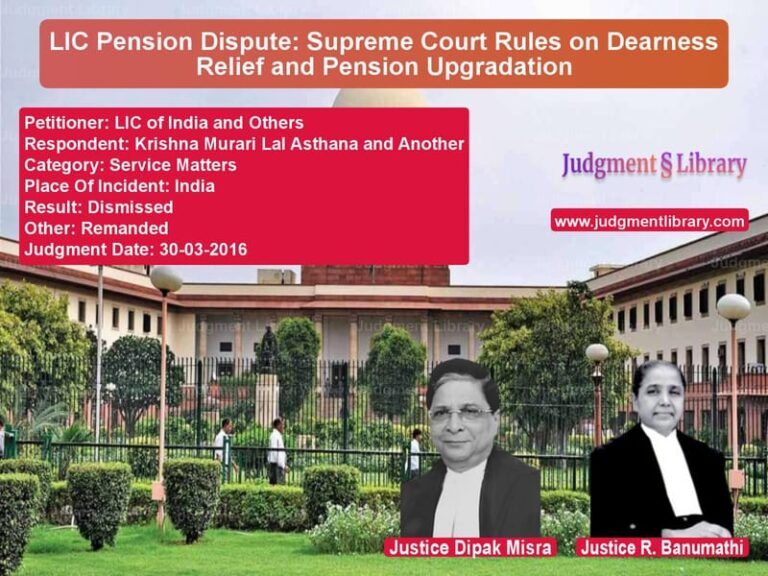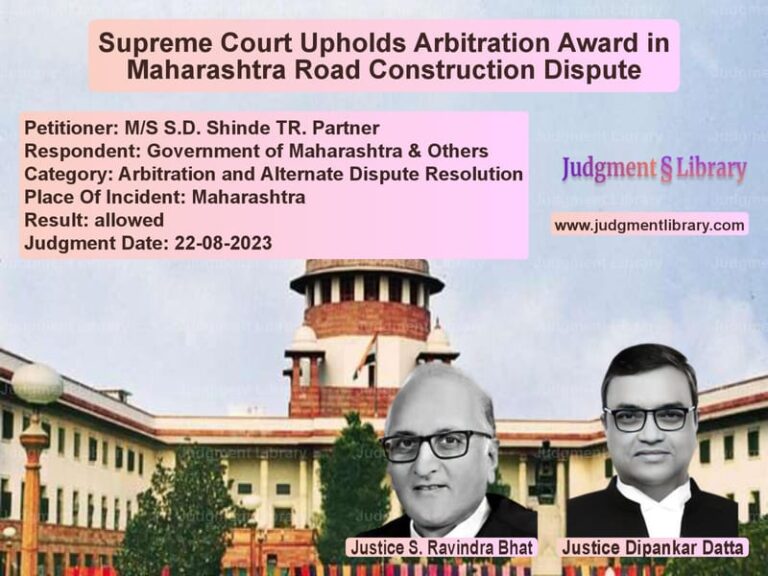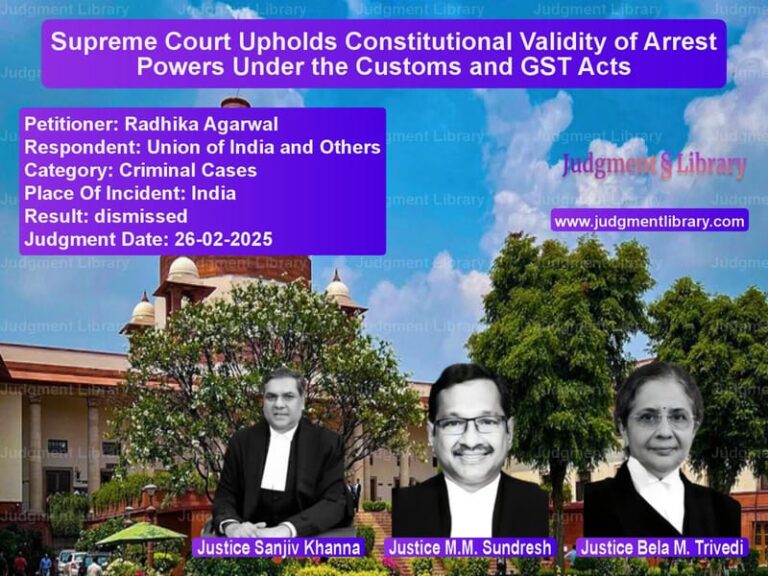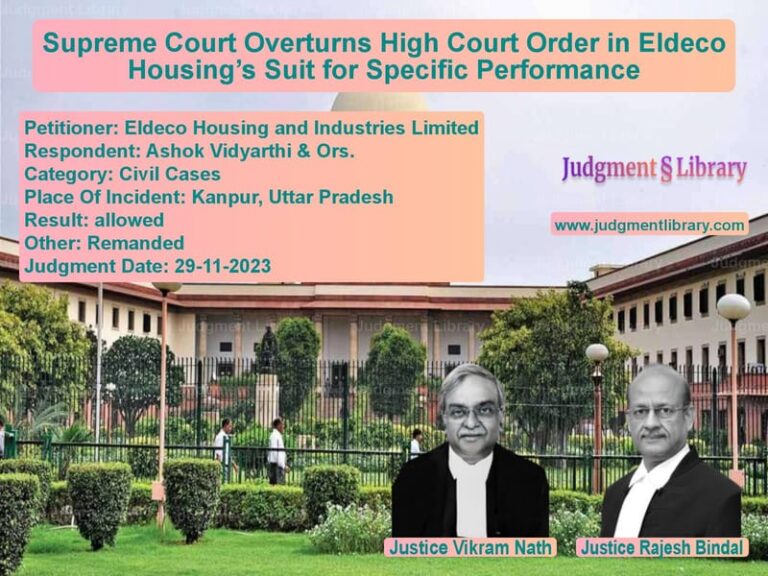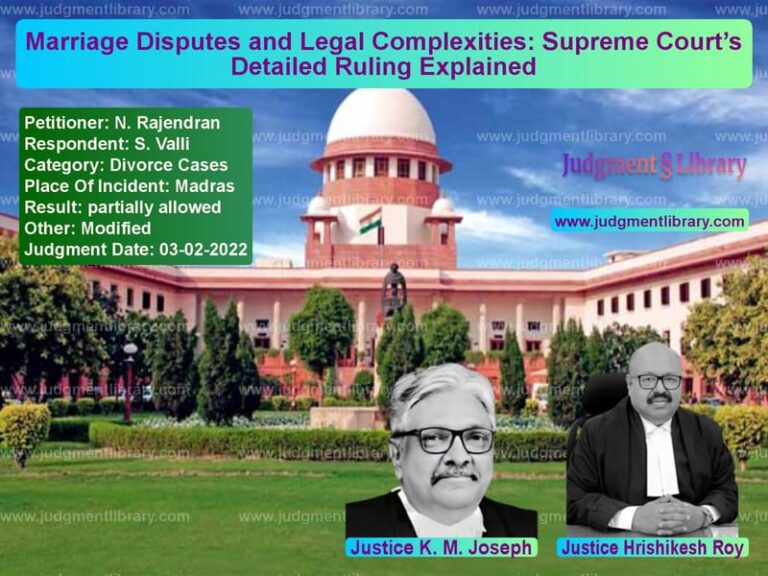Land Acquisition and Compensation: Judicial Review in Property Disputes
This case revolves around a series of legal disputes between the State of Madhya Pradesh and landowners concerning the compensation paid for land acquired for the expansion of the Nehru Zoological Park. The appeals in question arose from the landowners’ claim for enhanced compensation and the Revenue Department’s objections regarding the payment and deductions applied to the compensation. The case underscores the complexities of land acquisition, compensation calculation, and judicial review in matters related to public interest and property rights.
Background of the Case
The land in question, measuring 3.23 acres in Survey No. 268 of Attapur Village, Rajendranagar Mandal, Ranga Reddy District, was acquired for the purpose of expanding the Nehru Zoological Park. The acquisition process was initiated under the Land Acquisition Act of 1894, with notifications issued in March and April of 1981. Despite possession being taken, the formal award of compensation was not made, prompting the landowners to file a writ petition in the Andhra Pradesh High Court in 1996. The court directed the authorities to pass an award within three months, leading to the issuance of the award in June 1997. However, the compensation offered at the rate of Rs. 6 per square yard was deemed inadequate by the landowners.
In response, the landowners filed another petition, seeking reference under Section 18 of the Land Acquisition Act, 1894, for an enhancement in compensation. The petition was disposed of in 2003, with directions for the authorities to take appropriate action. Eventually, a Reference Court in 2012 ruled that the landowners were entitled to a compensation of Rs. 250 per square yard, along with solatium and interest.
The Legal Arguments
The Revenue Department, dissatisfied with the compensation amount determined by the Reference Court, appealed to the High Court, challenging the enhancement. The landowners, on the other hand, filed their own appeal, arguing that the compensation was still inadequate. The Revenue Department’s key argument was that the enhancement was too high and should be recalculated based on the market value at the time of acquisition, factoring in the development charges and the area used for development.
The landowners, represented by their counsel, contended that the compensation offered was still insufficient given the prime location of the acquired land, which had appreciated significantly in value over the years. They also argued that the compensation should reflect the development of the surrounding area, which had become more urbanized and commercially valuable. The landowners relied on the findings of the Reference Court and sought an even higher rate of compensation.
Read also: https://judgmentlibrary.com/noida-land-compensation-dispute-supreme-court-modifies-high-court-order/
The Court’s Consideration
The Supreme Court considered the facts of the case, particularly the historical context of the land acquisition and the prolonged litigation process. The Court noted that the land was acquired in 1981, a time when the area was not as developed as it is today. However, over the decades, the value of the land had increased significantly due to the surrounding developments, including the presence of the Agricultural University and the National Police Academy.
The Court referred to the sale deed from an adjacent village, Bahadurpur, dated 1981, which showed a price of Rs. 200 per square yard. Based on this, the Reference Court had determined a compensation of Rs. 250 per square yard, considering the proximity of the acquired land to Bahadurpur. The Court found that this valuation was supported by the evidence and should form the basis for the compensation.
However, the Court also acknowledged the mediation process that took place in 2016, where the landowners and the Revenue Department entered into a Joint Memorandum of Compromise. According to the compromise, the compensation was agreed to be Rs. 350 per square yard. The Court noted that this figure was a result of negotiations between the parties and reflected the current market value of the land. The Court further found that the Revenue Department had not raised any substantial objections to the figure of Rs. 350 per square yard, and therefore, the memorandum should be honored.
Read also: https://judgmentlibrary.com/execution-of-decrees-and-bank-recovery-supreme-courts-landmark-ruling/
The Court’s Judgment
The Court ruled that the compensation for the acquired land should be fixed at Rs. 350 per square yard, in accordance with the Joint Memorandum of Compromise reached during mediation. The Court emphasized that the agreed-upon figure was a fair reflection of the current market value of the land, taking into account the development of the surrounding areas and the long duration since the land was acquired. The Court also directed that the compensation be paid to the landowners without further delay.
The Court rejected the Revenue Department’s appeal, affirming that the compensation should not be reduced to Rs. 100 per square yard, as proposed by the High Court in its earlier order. The Court held that the decision of the Reference Court, along with the mediation agreement, represented a fair and just outcome for both parties.
Conclusion
This judgment reaffirms the importance of fair compensation in land acquisition matters, especially when the acquired land is located in areas that have undergone significant development. The Court’s decision to uphold the mediation agreement and fix the compensation at Rs. 350 per square yard ensures that the landowners are fairly compensated for their land, while also acknowledging the legal complexities and prolonged litigation in the case. The ruling also emphasizes the role of mediation in resolving disputes and achieving mutually agreeable solutions between the parties involved in land acquisition cases.
Petitioner Name: The Revenue Divisional Officer.Respondent Name: Ismail Bhai and Others.Judgment By: Justice S. Abdul Nazeer, Justice J.K. Maheshwari.Place Of Incident: Madhya Pradesh.Judgment Date: 22-11-2022.
Don’t miss out on the full details! Download the complete judgment in PDF format below and gain valuable insights instantly!
Download Judgment: the-revenue-division-vs-ismail-bhai-and-othe-supreme-court-of-india-judgment-dated-22-11-2022.pdf
Directly Download Judgment: Directly download this Judgment
See all petitions in Contract Disputes
See all petitions in Property Disputes
See all petitions in Consumer Rights
See all petitions in Judgment by S. Abdul Nazeer
See all petitions in Judgment by J.K. Maheshwari
See all petitions in dismissed
See all petitions in supreme court of India judgments November 2022
See all petitions in 2022 judgments
See all posts in Civil Cases Category
See all allowed petitions in Civil Cases Category
See all Dismissed petitions in Civil Cases Category
See all partially allowed petitions in Civil Cases Category


